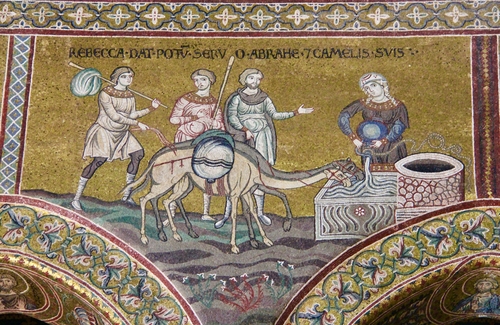Genesis 23 – The Death and Burial of Sarah
/0 Comments/in Through The Bible/by Andrea KoelschPart 27 in Pastor David Guzik’s in-depth study of the book of Genesis, expositing through chapter 23 in full. This chapter records the death and burial of Sarah – the wife of Abraham and mother of Issac, and the arrangement of her burial cave (Machpelah, Makhpela), which is still known today. Pastor David concludes by highlighting some of the ways that this chapter speaks to the personage and mission of Christ Jesus.
What God Sees – 1 Samuel 16:6-7 – July 30, 2024
/0 Comments/in Enduring Words for Troubled Times, Enduring Words with David Guzik, Podcast/by David GuzikProviding a King for God – 1 Samuel 16:1 – July 29, 2024
/0 Comments/in Enduring Words for Troubled Times, Enduring Words with David Guzik, Podcast/by David GuzikFinding God’s Will
/0 Comments/in Weekly Devotional/by David GuzikBlessed be the LORD God of my master Abraham, who has not forsaken His mercy and His truth toward my master. As for me, being on the way, the LORD led me to the house of my master’s brethren. (Genesis 24:27)
Genesis 24 tells the story of a special servant of Abraham who had the job to travel far, find a bride for his master’s son, and return with the chosen bride. The servant isn’t named in Genesis 24 but was likely Eliezer of Damascus mentioned in Genesis 15:2. We don’t know of any other person who held this position in Abraham’s household.

The servant had a big responsibility. The wife of Isaac, Abraham’s son, would have an important place in the unfolding plan of God’s covenant promises to Abraham and his descendants. It would be natural for Eliezer to think, “I must be led by God to find and choose the right woman, and then God must move on her heart to agree. It must be the woman God chooses.”
Genesis 24 explains that Eliezer did something that everyone must do when they want to discover and live out God’s will: he prayed (Genesis 24:12-14). He surrendered the matter to the LORD, and in faith asked God to guide him and all the circumstances around the finding and choosing of this special woman. God answered his prayers, and he found Rebekah, at a well in the distant land he had traveled to. Rebekah showed a true servant’s heart when she volunteered to do the difficult work of watering the camels of Eliezer, who was a stranger to her. Eliezer also discovered that Rebekah was perfect because she was related to Abraham’s relatives, from the land Abraham came from.
When Eliezer explained this to Rebeka’s family, he used these words: being on the way, the LORD led me to the house of my master’s brethren. There is something important in those words. Eliezer made it clear that God led him while being on the way. In other words, Eliezer didn’t just sit back and wait for God to reveal every detail before he moved forward. Instead, the servant of Abraham got busy with what he could do – he went on his way – and that was when the LORD led him.
Dear brother or sister, if you want to see God’s guidance in your life, get on your way. Be active. Take steps forward in some direction, and you will see God lead you being on the way. There may be times when God wants us to stop and wait for Him before we do anything, but that isn’t God’s normal way of leading. Normally, God wants us to get on our way and expect His guidance as we go.
Generally speaking, it’s our duty to get on our way according to what God has revealed and trust He will guide us.
It’s hard to steer a parked car. Get on your way, and let God lead you.




